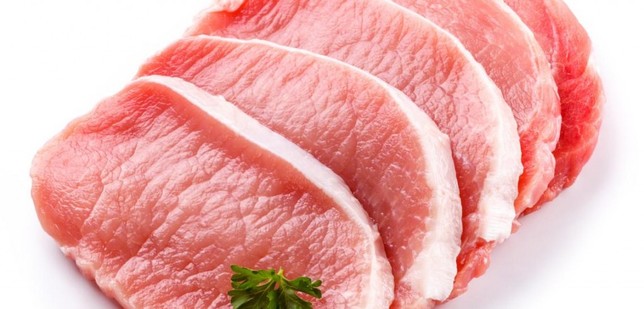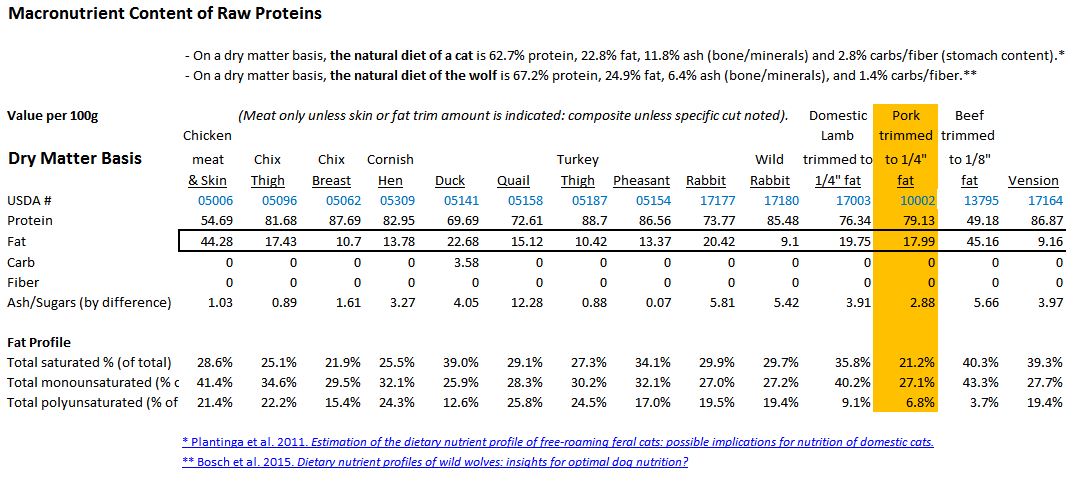YES! Pork is a wonderful meat for our pets. Most dogs and cats love pork and do very well with it. At Food Fur Life we often recommend pork loin as a starter meat when introducing raw food. For many it is essentially a “novel” protein that is easy to find and affordable. Of course it should be introduced properly as with any new food or new protein in a raw diet. An excellent source of taurine, pork is a healthy addition to any homemade food rotation for cats, too. (Though we'd like to note the more electrically active muscles will always have much higher concentrations, e.g. tongue, lung, heart and the dark meats - in pork, being the shoulder).
The most maligned meat, many of the myths and misconceptions surrounding the feeding of raw pork are simply outright misinformation; others are outdated health concerns. Let’s address those myths and fears. They are:
- Pork fat globules are too large. This is one of the oddest ones. The statement is “fat globules of pork are larger than other fat globules in other meats and can clog the small blood vessels of dogs.” We have NO idea when this rumor struck, but it tracks back to – of all places – Petco. No longer on their website (thank you!), this reason not to feed pork was included in a list of “Dangerous Foods and Plants.” The Internet Archive “Wayback Machine” captured a picture of that article on August 30, 2011. Raw feeders contacted Petco asking for the references for the claim: they were never provided and the article eventually removed. This information about pork fat simply isn’t true, yet the myth persists.
- Pork is too fatty. Actually, pork in 2017 is a lean meat. On a dry matter basis, pork trimmed to one-quarter inch fat is about 79% protein and 18% fat (see table, below). This compares to farmed rabbit, which is 74% protein, 20% fat; lamb, with 76% protein and 20% fat; and duck, at 70% protein and 23% fat. Chicken with skin is about 55% protein, 44% fat, which is similar to beef, with 50% protein and 45% fat. Clearly pork is not a particularly fatty option within our commercially available meats.
- Pork is high in saturated fats. While it is true that the natural diet of the cat and the natural diet of the dog's ancestor, the wolf, have different fat profiles than most of the meats raised commercially for human consumption, cats handle diets that are high in fats very well (of course, one must be careful not to overfeed, as fat does have almost twice as many calories as protein). Our domesticated dogs need only a moderate amount of fat in the diet, and a high fat diet is a risk factor for pancreatitis, particularly in some breeds of dogs. But ultimately, dogs and cats do not have the same physiological processes that create clogged arteries from saturated fats that people do. That pork is high in saturated fats, however, is an outdated concern: apart from having a lower fat content than most believe, according to the USDA, the saturated fat content of pork trimmed to one-quarter inch of fat is just 21%. That is the LOWEST option for saturated fat content of any commercially available meat except skinless chicken breast! What IS different about pork is the lower content of polyunsaturated fats. Of course, pork should be included in the diet rotation (not the sole protein in the diet), and properly constructed homemade diets (like that made with EZComplete premixes) contain omega 3s to provide a more appropriate omega 6-to-omega 3 ratio in our pets. Again, please refer to the table below.
- Pigs don’t sweat and release toxins. This is another odd rumor that pops up. First of all, pigs do sweat. Secondly, the liver and kidneys do the primary job of removing toxins from the body in mammals.
- My pet will get trichinosis. This is the most common reason people are afraid to feed raw pork. Trichinosis is caused by the roundworm parasite, trichinella. It was a widespread problem up to the mid-20th century, but in many parts of the world, aggressive management steps have been very effective, and in human grade commercial meats, trichinella is effectively non-existent. In the United States between 2008 and 2012, a total of 10 human cases of trichinosis reported were linked to consumption of commercial pork. Canada has had no confirmed cases since 1980, and while it varies from country-to-country within the EU, again, almost none of the reported cases are related to commercial pork. Sweden, Belgium and the Netherlands are declared trichinosis-free. Australia is also trichinella-free, and although there have been some recorded cases of the roundworm in wildlife in South Africa, there are no recorded cases of trichinosis in humans or domestic pets in South Africa. In fact, most reported cases around the world are associated with wild game, such as boar, deer, and bear. To kill trichinella (and other potential parasites), ALL wild hunted game should be frozen for three weeks at -5F (-20C). And if one is concerned about commercial meat, simply freeze it as one would for wild game.
Of course, when we say pork is a wonderful raw meat for our pets, we do not mean bacon or ham. Salted or smoked meats should never be fed to any pet due to the sodium content, heterocyclic amines, advanced glycation end products, smoke flavoring chemicals, nitrates and potentially preservatives. But cuts of pork meat such as loin, boneless rib meat, butt, shoulder – these are all excellent sources of protein and should be welcomed in any healthy meat rotation in a raw diet. With moderate fat, and low in saturated fats compared to other red meats, pork truly is “the other white meat.” So put your fears aside, and let your pets enjoy this nutritious protein in its natural state.


